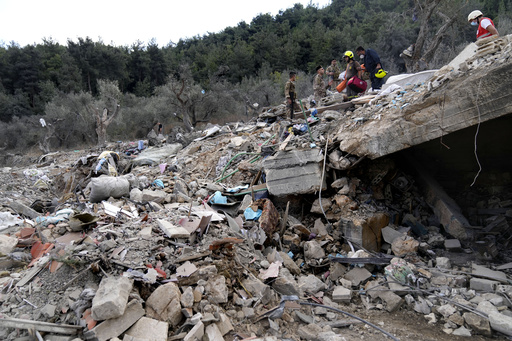
AITO, Lebanon — The United Nations’ human rights office has called for an independent investigation following an Israeli airstrike that struck an apartment building in northern Lebanon, resulting in at least 22 casualties. “There are serious concerns regarding adherence to the laws of war,” said Jeremy Laurence, a spokesperson for the U.N. human rights office. This statement was made a day after the attack, as rescue teams continued to search through debris and recover more bodies. Reports indicate that many victims included women and children.
According to the Israeli military, the airstrike targeted an establishment linked to the Hezbollah militant group. They acknowledged receiving reports about civilian implications and stated they would review these claims. The incident occurred in Aito, a small village located in the Christian region of Lebanon and some distance from Hezbollah’s primary stronghold in the southern and eastern parts of the country. The strike shocked local residents and heightened anxieties about a potential broader Israeli military operation within Lebanon.
“I heard a loud explosion,” noted Dany Alwan, a nearby resident. “We rushed outside and saw debris, smoke, and bodies scattered. It was a horrifying sight.” The three-story building had been occupied by the Hijazi family, who had fled Aitaroun, a southern village. Reports indicate that approximately 1.2 million individuals have evacuated their homes in southern and eastern Lebanon due to ongoing hostilities between Israel and Hezbollah.
As rescue efforts progressed on Tuesday, workers discovered a child’s body alongside dismembered remains that were gathered into a white bag. A bulldozer was observed clearing away twisted steel and rubble while the Lebanese military oversaw the operation.
In a related development, Hezbollah’s acting leader announced plans to intensify missile strikes against Israel unless it halts its airstrikes and ground operations in Lebanon. Naim Kassem commented on the group’s intention to cause harm to Israel, coinciding with news from the United States about sending a small troop contingent to support missile defense measures.
Over the past year, Hezbollah has launched thousands of rockets into Israeli territory in conjunction with Hamas’ conflict in Gaza. These hostilities have displaced tens of thousands of residents in northern Israel, prompting Israeli efforts to eliminate rocket threats to enable families to return to their homes.
Kassem indicated a shift towards targeting regions further south in Israel, including major cities like Tel Aviv and Haifa. He has been leading Hezbollah since the assassination of its longtime chief, Hassan Nasrallah, during an Israeli airstrike on September 27. Hostilities escalated on October 8, following a deadly assault by Hamas, which left over 1,200 people dead and 250 held as hostages in Gaza.
In the ongoing conflict, more than 42,000 fatalities have been reported in Gaza, although health officials do not distinguish between combatants and civilians. They indicate that slightly more than half of those killed are women and children. Hezbollah maintains that its actions will persist until a cease-fire is authorized in Gaza. As Kassem stated, “We cannot detach Lebanon from Palestine, or Palestine from the world.”
On a similar note, Pentagon spokesperson Maj. Gen. Pat Ryder announced that U.S. troops arrived in Israel on Monday to operate a Terminal High-Altitude Area Defense battery designed to counter ballistic missile threats from Iran, a significant supporter of both Hezbollah and Hamas, which has conducted missile attacks on Israel. Ryder affirmed that additional military personnel and THAAD equipment will be dispatched to Israel in the coming days.
Iranian warnings have indicated that U.S. troops could be at risk should further military actions occur. In the meantime, the ongoing Israeli bombardment and ground campaigns have displaced more than 400,000 children in Lebanon according to Ted Chaiban, deputy executive director of UNICEF, the United Nations’ agency focused on children’s welfare.
